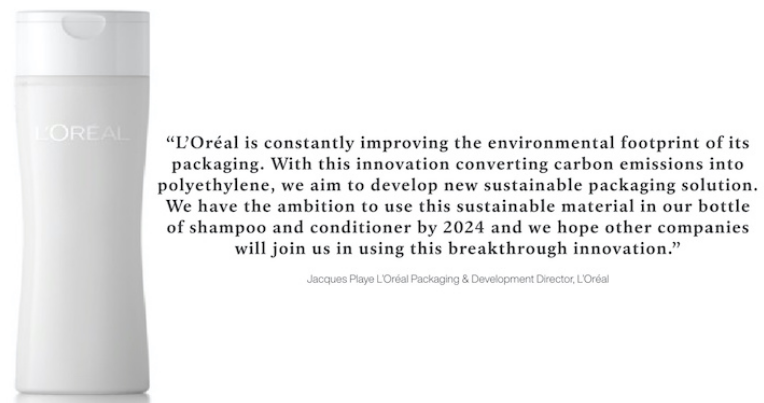
2020-11-09 17:38:58
L'Oreal Is Testing the World's First Shampoo Bottle Made From Carbon Emissions
2020-11-09 17:38:58

L'Oreal is currently testing the word's first shampoo bottle made from captured and recycled carbon emissions. The sustainable packaging innovation was developed by three partners—L'Oreal, recycling expert LanzaTech, and energy company Total.
Here's how the carbon emissions are captured and converted;
- LanzaTech captures industrial carbon emissions and converts them into ethanol using a unique biological process.
- Total, thanks to an innovative dehydration process jointly developed with IFP Axens, converts the ethanol into ethylene before polymerizing it into polyethylene. The newly created PE will have the same technical characteristics as its fossil counterpart.
- L’Oréal uses this polyethylene to produce packaging with the same quality and properties as conventional polyethylene.
The new bottle proves that industrial carbon emissions can be used to produce plastic packaging—paving the way for new opportunities for the capture and re-use of industrial carbon emissions.
Jacques Playe, packaging and development director, L’Oréal, said, “L’Oréal is constantly improving the environmental footprint of its packaging. With this innovation—converting carbon emissions into polyethylene—we aim to develop new sustainable packaging solutions."
Playe continues, "We have the ambition to use this sustainable material in our shampoo and conditioner bottles by 2024 —and we hope other companies will join us in using this breakthrough innovation.”
Next Steps: Scaling Production by 2024
The partners now intend to continue working together on scaling the production of these sustainable plastics. Consumers might expect to see the first shampoo and conditioner bottles made from carbon emissions by 2024.Jennifer Holmgren, CEO, LanzaTech, says, “This partnership is based on a shared goal of creating a cleaner planet for everyone. We are grateful to both L’Oréal and Total...together, we can reduce the carbon footprint of packaging by converting carbon emissions into useful products, making single-use carbon a thing of the past.”
Valérie Goff, senior vice president of Polymers, Total, announced: "This partnership is an excellent example of collaboration between industrial firms in developing the plastics of the future...the development of this new pathway of valuing industrial carbon emissions also contributes to the Group's commitment to get to net zero in Europe by 2050.”
LinkedIn




